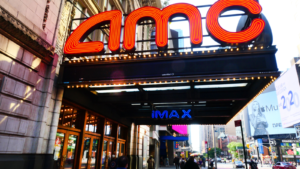I’ve seen my fair share of fads come and go. Robinhood (NASDAQ:HOOD), the popular trading app favored by Gen Z and millennial investors, offers many stocks I’d equate to fads. The platform has enabled a new generation to dive into the stock market. However, some of the most hyped-up stocks on Robinhood have underlying businesses that are destined to fail in the long-run. Their outdated business models simply can’t keep up with the rapidly evolving tastes of younger consumers.
History has shown that companies that fail to innovate and adapt to the next generation’s needs eventually fizzle out. They may limp along for a while. But declining sales and market share will eventually catch up to them. And if these companies are already unprofitable, their demise is likely even more imminent.
With that in mind, I’ll be discussing three Robinhood stocks that I believe are prime candidates to sell before Gen Z moves on. Let’s take a closer look!
AMC Entertainment (AMC)

AMC Entertainment (NYSE:AMC) operates movie theaters, but faces major headwinds as consumer preferences shift to streaming. The company completed a $250 million share sale in May, diluting shareholders by around 25% and causing the stock price to plummet more than 14%.
AMC has also repeatedly tapped equity markets to fund its operating losses and repay its substantial $8.6 billion debt load, as the value of its liabilities now exceeds its assets. Analysts expect AMC’s revenue to drop 7% in 2024, and the company is not projected to turn a profit. Net income is negative, even if you exclude interest expenses.
I believe AMC’s movie theater business model is dying in the face of the convenience offered by streaming platforms. Younger generations increasingly prefer streaming over going to theaters. Unless AMC can adapt, I don’t see how the company can survive long-term, given its financial challenges and the secular decline of movie theaters.
Virgin Galactic (SPCE)

Virgin Galactic’s (NYSE:SPCE) future looks grim, as the company faces mounting financial challenges which have been partly driven by a flawed business model. The space tourism company has reported more than $100 million in losses each quarter, with its cash reserves dwindling to $867 million as of Q1 2024. I believe Virgin Galactic is on a path to further dilution and reverse stock splits in the coming quarters as it starts running out of money. It’s hard to argue that cash won’t run out by 2026.
The company already implemented a 1-for-20 reverse split in June 2024 to regain compliance with NYSE listing requirements after its stock price fell below $1.
Analysts have raised concerns about Virgin Galactic’s long-term viability, with some even suggesting bankruptcy risk is on the horizon. The company’s space tourism tickets are extremely expensive, yet it still operates at a steep loss. In Q1 2024, Virgin Galactic reported a net loss of $102 million on a mere $2 million in revenue. I think the company is simply ahead of its time. Right now, there isn’t enough demand or hype to make its business model profitable. As cash reserves dwindle, I expect SPCE stock will continue to dilute toward zero.
GameStop (GME)

GameStop’s (NYSE:GME) stock has soared lately, thanks to the resurgence of the meme stock phenomenon, but I believe investors should be cautious. The company’s Q1 2024 results were disappointing, with net sales down significantly from $1.24 billion in Q1 2023 to $882 million. GameStop is also still unprofitable, with a net loss of $32.3 million for the quarter.
The only analyst currently covering the stock, Michael Pachter at Wedbush, has a sell rating and recently lowered his price target. I think Pachter is right to be skeptical. GameStop may have over $1 billion in cash thanks to issuing more shares, but without a clear turnaround plan, I worry the company will simply continue to burn through that money. And why hold GME stock in the first place if management just punishes big rallies by selling more shares?
In addition, the shift to digital gaming continues to be a huge headwind for GameStop’s core business of selling physical games. Revenue has been in decline for years, and cost-cutting can only go so far. Unless GameStop can successfully pivot its business model, which I’m doubtful about given the entrenched competition from the likes of Steam, the company looks to be on an unsustainable path. The meme stock hype may lead to short-term pops, but the company’s underlying fundamentals paint a grim long-term picture for GameStop investors.
On the date of publication, Omor Ibne Ehsan did not hold (either directly or indirectly) any positions in the securities mentioned in this article. The opinions expressed in this article are those of the writer, subject to the InvestorPlace.com Publishing Guidelines.
